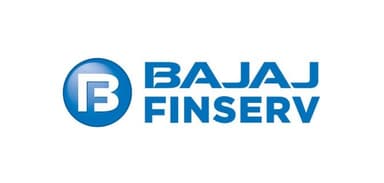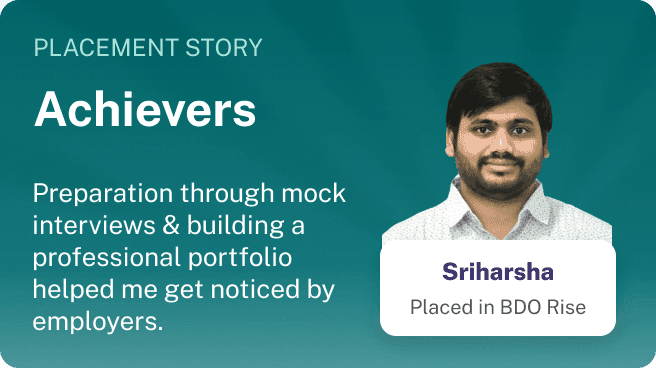BBA Course Highlights
The BBA (Bachelor of Business Administration) program is designed to help students build a strong foundation in business and management, and understand how key business functions operate in real-world organisational settings.
our promise
Kickstart your career with diverse job opportunities

-
150+ Varied job profile
-
1020+ Unique job opportunities
-
305+ Students with 2+ offers
Choose from 15+ top colleges & make your application process easier!
6+ BBA Specialisations
What is the eligibility criteria for BBA?
- Passed 12th from a recognised board
- 50% marks in aggregate
- Compulsory subjects like english or any other is specific to campus guidelines
BBA Course Fees
The total fee for the BBA program depends on the selected college or university, campus location, and eligibility criteria. Since fee structures vary across partner institutions, students are advised to check campus-wise and course-wise BBA fees before applying.
0 Cost EMI available
Up to 100% scholarship available
Get 200+ assured opportunities with Placement Opportunity Program
Calculate fees
*Terms & conditions apply
Key Offerings
70+ sessions by industry experts and ex-IIM faculty
Capstone projects every semester
Professional portfolio to increase chances of getting hired
10 in-demand advanced certifications to choose from
Seed funding support for budding entrepreneurs
180+ hours of Mock GD/PI Training
10 days of global immersion in Dubai or Singapore
Get 200+ assured placement opportunity or get 1st year tuition fee back
Get placed where you belong



























The Sunstone Philosophy
helps you learn from the best and provide a hands-on experience so your education is not just limited to theory
Learn from Recruiters
Learn from MDs, CEOs & Founders of leading companies with 10+ years of hiring experience
10+Industry Experts 70+Expert Sessions
Practice in the Real World
Practice what you learn and develop in-demand skills with real-world opportunities

8+ months of immersive internships
Practice the skills you acquire in the classroom with industry internships

Capstone projects
Application-based industry-relevant projects to make you job-ready from Day 1

Industry visits
Experience how theoretical concepts learnt in class are put into action
Create your own Portfolio
Increase your chances of getting hired by showcasing your verified skills and experience with a professional portfolio
All your professional work in one place, with easy sharing access
Easy portfolio-building with lifetime free service

BBA Student portfolio
Holistic Learning
Transform your career journey with real-world learning and experiences beyond classroom
Industry Recognised Credentials
- Credential 1
- Credential 2
BBA Degree
- Earn a UGC-recognised/AICTE-approved degree
- Learn fundamentals of business administration
- Equip yourself with industry-relevant skills

Explore
Life at Sunstone
Cultivate the leader in you with our unique offerings.
Discover our communityStudent Testimonials
Our Success Stories

BBA Diaries
Know more about BBA programs, syllabus, and colleges with our blogs
BBA Salaries in India: Detailed Guide to Salary after BBA
By Bhavya Thakkar
25 Jul,2022BBA Computer Applications - Scope, Syllabus, Admission, Colleges and Salary
By Christy J. Varghese
22 Dec,2022BBA in Business Analytics: Admission, Fees, Eligibility, Jobs and Syllabus
By Admin
01 Sep,2025Difference Between BBA and BBM - Which One to Choose?
By Rahul Kr.
27 Jan,2023
BBA Summary
- BBA, also known as Bachelor of Business Administration, is one of the most popular undergraduate management programs in India, designed for students seeking an early foundation in business and management studies.
- The standard duration of a regular BBA course is three years, typically divided into six semesters, although the exact structure may vary depending on the institution or university.
- To be eligible for a BBA program, candidates generally need to score a minimum of 50% marks in 10+2 (secondary education). For candidates belonging to reserved categories, the minimum required marks are often 45%, as per institutional norms.
Frequently Asked Question
- What is the full form of BBA?
The full form of BBA is Bachelor of Business Administration which is a 3-year undergraduate program focusing on business management and administration. Students learn about marketing, finance, accounting, and management.
- Who can apply for BBA?
Students who have completed 10+2 (high school) from a recognized board can apply for BBA programs in India.
- How long is the BBA course?
The full-time BBA course is usually three years long and is divided into six semesters.
- What subjects are studied in BBA?
Students learn business management, marketing, finance, human resources, operations, economics, accounting, and communication.
- What is the admission process for BBA?
Admission typically requires 10+2 marks. Some colleges may also conduct entrance exams or interviews for selection.
- Are entrance exams required for BBA?
Many colleges accept 10+2 scores directly. Some institutes may have their own entrance tests for BBA admissions.
- What jobs are available after BBA?
Graduates can work as business analysts, sales executives, HR assistants, marketing executives, operations associates, and management trainees.
- Is BBA good for career growth?
Yes. BBA builds strong business and management skills, which help students start careers in corporate, sales, finance, and leadership roles.
- What is the average salary after BBA in India?
Average salary for BBA graduates in India typically ranges from ₹2.5 LPA to ₹5 LPA, depending on job role and company.
- Does BBA include internships?
Yes. Most BBA programs include internships and industry projects to give real-world work exposure during the course.
- What is BBA at Sunstone?
Sunstone BBA is offered through partner colleges with practical learning, industry exposure, projects, and career support.
- What is eligibility for BBA at Sunstone?
Students who have completed 10+2 with required marks from a recognized board are eligible to apply for Sunstone BBA.
- What is the BBA fee range at Sunstone partner colleges?
BBA fees at Sunstone partner colleges typically range from ₹1.8 lakh to ₹4 lakh for the full three-year program, depending on the college.
- Does Sunstone BBA offer placement support?
Yes. Sunstone provides placement training, career coaching, interview preparation, and access to job opportunities for BBA students.
- What is POP in Sunstone BBA?
POP (Placement Opportunity Program) helps students prepare for interviews, build professional skills, and connect with employers for jobs.
APPLY FOR UG AND PG PROGRAMS
Enter a world of
Possibilities












